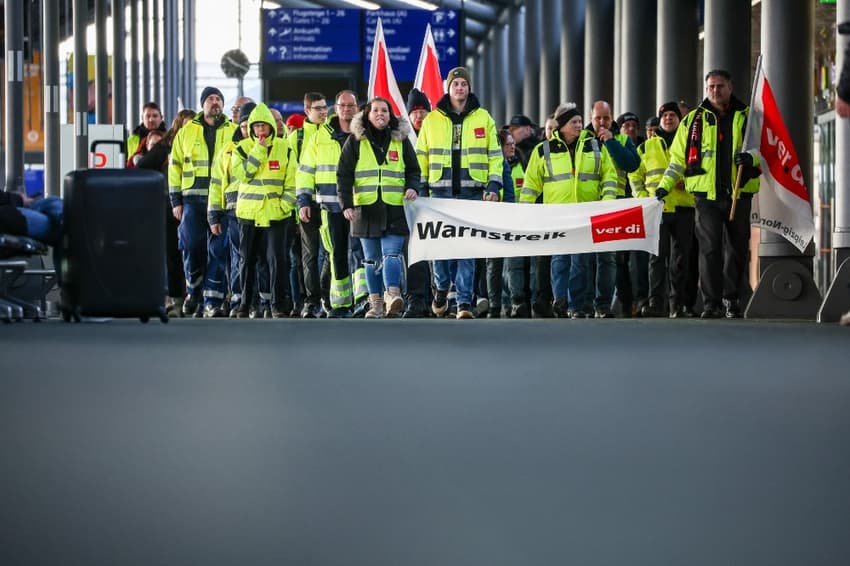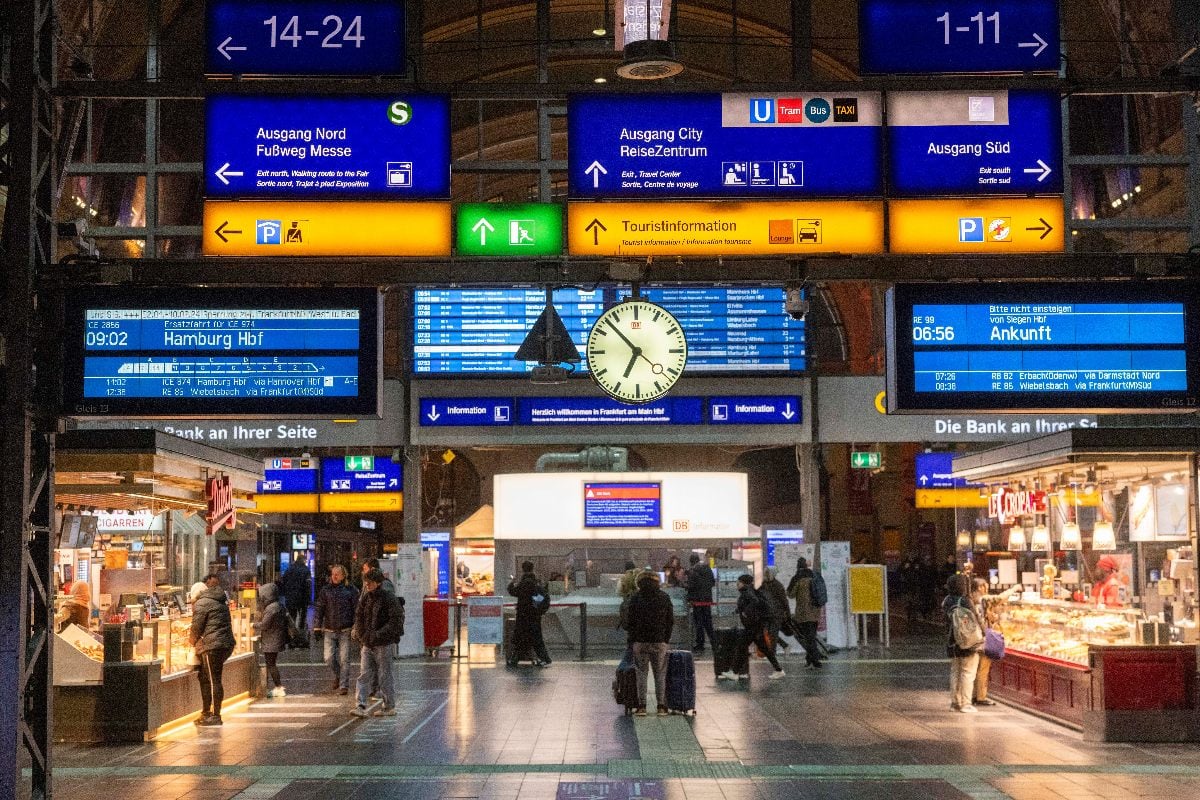Today in Germany: A roundup of the latest news on Friday

Strikes continue at a new set of airports, urgent Ukraine war summit to take place in Berlin, German minister says 2030 climate target is possible and more news from around Germany on Friday.
More airport and public transport strikes around Germany
On Friday, aviation security staff are set to take part in all-day strikes in in Hanover, Dortmund, Weeze, Dresden and Leipzig, and at Karlsruhe/Baden-Baden for the second day in a row.
A strike on Thursday took place at five airports around Germany, and led to thousands of cancelled flights. At Berlin Brandenburg (BER) all departing flights were axed.
Germany's largest airport in Frankfurt was not affected by the warning strikes on either day, though was hit by a Lufthansa cabin crew flight on Tuesday and Wednesday which led to many flight delays and cancellations.
Meanwhile, a three-day strike is taking place on local public transport in Frankfurt and Hesse. It started on Wednesday and is set to run through the end of the night shift on Saturday morning.
READ ALSO: Why Germany is being hit by strikes almost every day
Employers call for stricter rules on strikes
As strikes continue to hit Germany almost every day - particularly in the transport sector - calls are growing for a reform of the right to strike.
"The strikes in the critical infrastructure are not only annoying, they are also a brake on growth,” managing director of the Federal Association of Employers’ Associations, Steffen Kampeter, told the Rheinische Post.
"The economic damage not only affects the companies directly affected, but also the entire economy."
Kampeter described the unions' actions as "disproportionate" and called on politicians to act. "We need clear industrial action law, especially for the railways and comparable areas."
The unions argue their demands are reasonable as the cost of living has gone up considerably in Germany in recent years, and working conditions have worsened due to factors like staff shortages.

Travellers at Frankfurt main station in January as GDL strike got underway. Photo: picture alliance/dpa | Helmut Fricke
Minister sees Germany on track for 2030 climate target
Economics and Climate Protection Minister Robert Habeck believes that Germany's climate protection target for 2030 is achievable.
"If we stay on course, we will achieve our climate targets for 2030," said the Green politician in a statement published on Friday, referring to new data from the Federal Environment Agency.
According to the Climate Protection Act, German greenhouse gas emissions are to be reduced by 65 percent by this year compared to 1990.
In its new projection report, the Federal Environment Agency assumes a reduction of just under 64 percent. According to the ministry, the target is therefore within reach. Last year, a reduction of 63 percent was expected, and only 49 percent in the previous year.
Urgent Ukraine talks to take place in Berlin Friday
The leaders of France, Germany and Poland will hold urgent talks on Ukraine in Berlin on Friday, Warsaw and Berlin said, as they seek to scrape together additional support for Kyiv.
The talks come on the heels of a meeting between US President Joe Biden and Polish leaders in Washington, shortly after the US leader announced an emergency stopgap package for Ukraine.
German Chancellor Olaf Scholz said it was "of great importance" that the three countries of the so-called Weimar Triangle meet to discuss the war in Ukraine.
"We must do everything we can to organise as much support as possible for Ukraine," Scholz said at a Berlin press conference alongside Thai premier Srettha Thavisin.
Scholz said the "Weimar Triangle", a diplomatic format for French, German and Polish cooperation established in 1991, was "an important format for political exchange".
Relations between the allies have been strained by Germany's refusal to send long-range Taurus missiles to Ukraine, despite urgent calls from Kyiv.
READ ALSO: Ukraine says Germany 'wasting time' on missile decision
German defence firm Rheinmetall plans Ukraine arms factories
German arms manufacturer Rheinmetall said Thursday it plans to set up at least four factories in Ukraine, as it targets a record €10 billion in sales this year.
The Ukraine war has boosted Germany's weapons industry as countries seek to re-arm in the face of the growing threat from Russia, and soaring demand last year propelled Rheinmetall onto the blue-chip DAX index.
The company said the factories in Ukraine - which has been suffering from ammunition shortages as Moscow makes battlefield gains -- would be for producing shells, military vehicles, gunpowder and anti-aircraft weapons.
"Ukraine is now an important partner for us, where we see a potential of between two and three billion euros (in sales) per year," Rheinmetall CEO Armin Papperger said at the presentation of the company's 2023 results.
The Düsseldorf-based group -- which makes parts of the Leopard tanks that Berlin agreed could be sent to Ukraine after much hesitation -- reported record sales of €7.2 billion last year, and is aiming to top €10 billion in 2024.
With reporting from AFP.
Comments
See Also
More airport and public transport strikes around Germany
On Friday, aviation security staff are set to take part in all-day strikes in in Hanover, Dortmund, Weeze, Dresden and Leipzig, and at Karlsruhe/Baden-Baden for the second day in a row.
A strike on Thursday took place at five airports around Germany, and led to thousands of cancelled flights. At Berlin Brandenburg (BER) all departing flights were axed.
Germany's largest airport in Frankfurt was not affected by the warning strikes on either day, though was hit by a Lufthansa cabin crew flight on Tuesday and Wednesday which led to many flight delays and cancellations.
Meanwhile, a three-day strike is taking place on local public transport in Frankfurt and Hesse. It started on Wednesday and is set to run through the end of the night shift on Saturday morning.
READ ALSO: Why Germany is being hit by strikes almost every day
Employers call for stricter rules on strikes
As strikes continue to hit Germany almost every day - particularly in the transport sector - calls are growing for a reform of the right to strike.
"The strikes in the critical infrastructure are not only annoying, they are also a brake on growth,” managing director of the Federal Association of Employers’ Associations, Steffen Kampeter, told the Rheinische Post.
"The economic damage not only affects the companies directly affected, but also the entire economy."
Kampeter described the unions' actions as "disproportionate" and called on politicians to act. "We need clear industrial action law, especially for the railways and comparable areas."
The unions argue their demands are reasonable as the cost of living has gone up considerably in Germany in recent years, and working conditions have worsened due to factors like staff shortages.

Minister sees Germany on track for 2030 climate target
Economics and Climate Protection Minister Robert Habeck believes that Germany's climate protection target for 2030 is achievable.
"If we stay on course, we will achieve our climate targets for 2030," said the Green politician in a statement published on Friday, referring to new data from the Federal Environment Agency.
According to the Climate Protection Act, German greenhouse gas emissions are to be reduced by 65 percent by this year compared to 1990.
In its new projection report, the Federal Environment Agency assumes a reduction of just under 64 percent. According to the ministry, the target is therefore within reach. Last year, a reduction of 63 percent was expected, and only 49 percent in the previous year.
Urgent Ukraine talks to take place in Berlin Friday
The leaders of France, Germany and Poland will hold urgent talks on Ukraine in Berlin on Friday, Warsaw and Berlin said, as they seek to scrape together additional support for Kyiv.
The talks come on the heels of a meeting between US President Joe Biden and Polish leaders in Washington, shortly after the US leader announced an emergency stopgap package for Ukraine.
German Chancellor Olaf Scholz said it was "of great importance" that the three countries of the so-called Weimar Triangle meet to discuss the war in Ukraine.
"We must do everything we can to organise as much support as possible for Ukraine," Scholz said at a Berlin press conference alongside Thai premier Srettha Thavisin.
Scholz said the "Weimar Triangle", a diplomatic format for French, German and Polish cooperation established in 1991, was "an important format for political exchange".
Relations between the allies have been strained by Germany's refusal to send long-range Taurus missiles to Ukraine, despite urgent calls from Kyiv.
READ ALSO: Ukraine says Germany 'wasting time' on missile decision
German defence firm Rheinmetall plans Ukraine arms factories
German arms manufacturer Rheinmetall said Thursday it plans to set up at least four factories in Ukraine, as it targets a record €10 billion in sales this year.
The Ukraine war has boosted Germany's weapons industry as countries seek to re-arm in the face of the growing threat from Russia, and soaring demand last year propelled Rheinmetall onto the blue-chip DAX index.
The company said the factories in Ukraine - which has been suffering from ammunition shortages as Moscow makes battlefield gains -- would be for producing shells, military vehicles, gunpowder and anti-aircraft weapons.
"Ukraine is now an important partner for us, where we see a potential of between two and three billion euros (in sales) per year," Rheinmetall CEO Armin Papperger said at the presentation of the company's 2023 results.
The Düsseldorf-based group -- which makes parts of the Leopard tanks that Berlin agreed could be sent to Ukraine after much hesitation -- reported record sales of €7.2 billion last year, and is aiming to top €10 billion in 2024.
With reporting from AFP.
Join the conversation in our comments section below. Share your own views and experience and if you have a question or suggestion for our journalists then email us at [email protected].
Please keep comments civil, constructive and on topic – and make sure to read our terms of use before getting involved.
Please log in here to leave a comment.